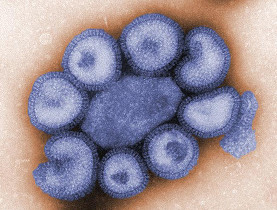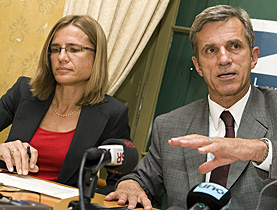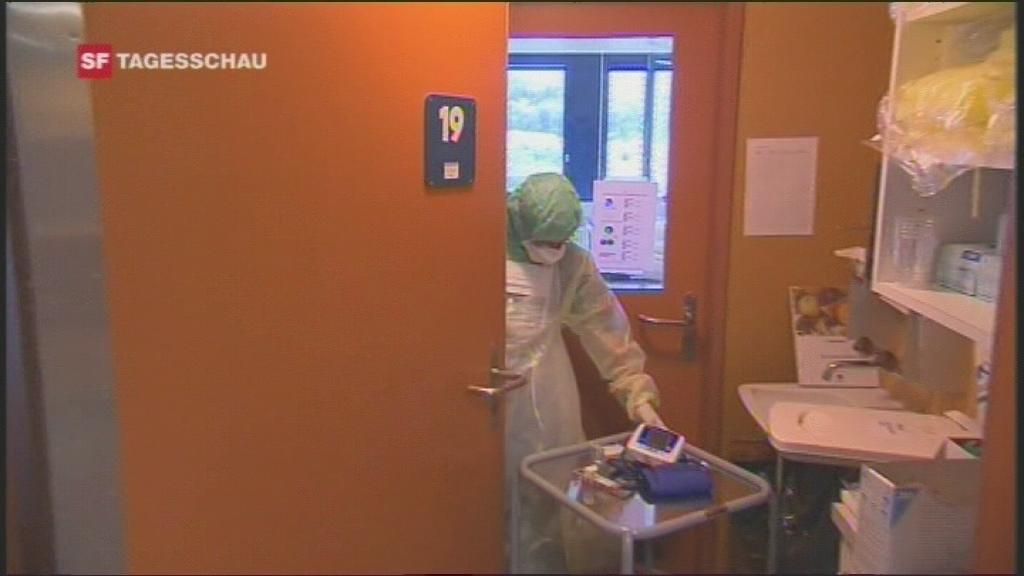Travellers and swine flu venture hand-in-hoof

Amidst the peak of the summer travel season, Swiss holidaymakers may be returning home with a most unwelcome souvenir: a case of the swine flu.
Nearly 20 per cent of the country’s population could be infected but authorities have characterised the predicted increase in cases of the A/H1N1 virus as more an organisational challenge than a major threat to public health.
“We expect up to five times more flu patients than during the country’s normal flu season,” Federal Health Office spokesman Jean-Louis Zurcher told swissinfo.ch. “That would be about 1.5 million cases.”
Switzerland’s population is slightly over 7.5 million people.
The World Health Organization said on Tuesday that deaths from the new virus rose to over 700 from about 330 at the start of July.
Swiss federal officials say they will monitor the global spread of the virus and make recommendations but implementing specific measures is the responsibility of the country’s cantons.
Among the recommendations: a vaccination policy. Some form of protection should be ready by the autumn and could be effective against the winter flu as well. But until then, the spread of A/H1N1 is unstoppable, they say.
People seem undeterred from giving up their summer holidays, as the consequences of the flu are not much different from the normal seasonal flu. But as more become infected and as more areas become hot zones, the risk that travellers will come into contact with sick people becomes higher.
Europe’s busy travel season is in full swing: airports, airplanes, buses, hotels and public transport are overflowing, leading to scores of people being within sneezing range of each other.
According to Travelmole, an online service for the travel industry, experts no longer rule out the possibility that swine flu could bring about chaos – for example, cruise lines rejecting passengers with symptoms.
Fever scanners at check-in?
In Britain, which has experienced a particularly high number of cases, British Airways and Virgin Airlines have started inspecting passengers at check-in and barring those exhibiting symptoms from boarding.
Zurcher of the Federal Health Office says these checks are useless. Andrea Müller, a spokeswoman for Kuoni, Switzerland’s leading tour company, believes that airports must already have a plan for what to do with people with obvious flu symptoms get off the aircraft.
“The airport doctor knows that quarantine facilities are available not only in airports but also in hotels. Flu sufferers do not necessarily need to go to the hospital,” she said.
Unlike most domestic operators, Kuoni also brings in many tourists from overseas into Switzerland. “Every country has its pandemic plan and many contracts with hotels as well. And the local Kuoni guides know this and also know doctors,” Müller said.
Switzerland has identified most of its swine flu cases in people returning from abroad. But what will happen if the some of the many foreign tourists visiting bring the flu across the country’s borders?
“These guests must remain in Switzerland until they are no longer contagious,” said Veronique Kanel, an official with Switzerland Tourism. They may be sent to a hospital or remain under quarantine, she added.
Like salmonella outbreaks
Swine flu may be a new phenomenon but the travel industry has experience with other outbreaks. The cruise industry is no stranger to salmonella scares, for example. British firm P&O Cruises requires its passengers to fill out a medical form before they are allowed onboard.
Kuoni says the cruise industry is responsible for maintaining a healthy environment aboard their vessels. “In the worst case, the whole ship would become a quarantine station. The cruise industry is prepared for this because it has experienced similar epidemics,” Müller said.
M-Travel, another Swiss firm, has no specific measures planned but deals on a case-by-case basis. “If somebody doesn’t say anything at check-in but obviously displays fever symptoms, he or she will in any case be dealt with by the travel coordinator,” spokeswoman Gaby Malacrida told swissinfo.ch.
Andy Keller of Elvia, a travel insurance company, said: “Epidemics and pandemics are basically always excluded from travel insurance policies.” He says if they weren’t, insurers would go bankrupt.
Elvia nevertheless contributed small subsidies at the beginning of the outbreak to travellers with Mexican vacation plans. The company presently does not have a policy to insure against swine flu.
Alexander Künzle, swissinfo.ch (Translated from German by Justin Häne)
Swiss authorities say the following areas are at an increased risk: the United States, the Caribbean, Australia, New Zealand, Hong Kong, Japan, the Philippines, Singapore, Thailand, Israel, Britain and Spain.
The Federal Health Office says it will test vaccine in September. It could be introduced in October.
It will then have to be licensed by the national licensing authority, Swissmed.
Switzerland has ordered 13 million doses, the Federal Healthh Office says.
Authorities predict a strong increase in cases of A/H1N1 in September.
Most cases in Switzerland come from returning holidaymakers. People then pass on the virus to families and people in schools.
Flu outbreaks either appear seasonally or as pandemics. This has nothing to do with the level of danger a virus poses.
Seasonal flu has been known for centuries. Outbreaks are caused by person-to-person transmission, such as coughing, sneezing or touching.
Flu pandemics affect the entire world. New viruses pose more of a threat because human immune systems take time to build resistance.
Animals are also susceptible to flu viruses.
The A/H1N1 virus is a combination of two pig viruses, one poultry virus and a human virus. It first appeared in Mexico.

In compliance with the JTI standards
More: SWI swissinfo.ch certified by the Journalism Trust Initiative




You can find an overview of ongoing debates with our journalists here. Please join us!
If you want to start a conversation about a topic raised in this article or want to report factual errors, email us at english@swissinfo.ch.